Nana Pazhava, Zugdidi
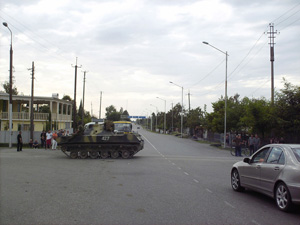 Russian troops still remain in Samegrelo region. Last deployment of Russian militants and heavy armor equipment in Zugdidi started on August 14. About 150 tanks took destination towards Senaki from Upper Abkhazia at 7:00 PM. In parallel to it, about 40 trucks crossed central motorway of Tbilisi-Senaki-Leselidze in the direction of Enguri River. The trucks were loaded with the stuff robbed from Poti and Senaki Georgian military bases. Zugdidi residents greeted Russian soldiers with scolding. The city is paralyzed. Most part of inhabitants has fled from Zugdidi. Population is panicked in the expectation of up-coming military aggression.
Russian troops still remain in Samegrelo region. Last deployment of Russian militants and heavy armor equipment in Zugdidi started on August 14. About 150 tanks took destination towards Senaki from Upper Abkhazia at 7:00 PM. In parallel to it, about 40 trucks crossed central motorway of Tbilisi-Senaki-Leselidze in the direction of Enguri River. The trucks were loaded with the stuff robbed from Poti and Senaki Georgian military bases. Zugdidi residents greeted Russian soldiers with scolding. The city is paralyzed. Most part of inhabitants has fled from Zugdidi. Population is panicked in the expectation of up-coming military aggression.
Samegrelo region was bombed by Russian air forces several times. According to official data, as a result of bombardment 30 people died. Unofficial sources state that the number of the dead people amounted to 75.
Russian air forces started bombing at 1:00 AM on August 9. Five military planes flew into Samegrelo region from Abkhazia; they dropped bombs on Poti fleet police station. Then they flew to Senaki and bombed military base there.
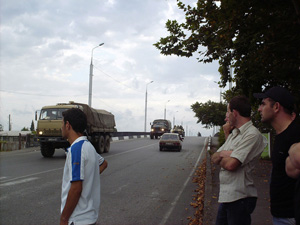 Georgian reservists were in Senaki by that time who intended to depart for Tskhinvali. Witnesses report that part of reservists was sitting in the bus; another part was in the military quarters and was getting ready for the departure. Seven reservists died as a result of the bombardment in the village of Kheta in Khobi district.
Georgian reservists were in Senaki by that time who intended to depart for Tskhinvali. Witnesses report that part of reservists was sitting in the bus; another part was in the military quarters and was getting ready for the departure. Seven reservists died as a result of the bombardment in the village of Kheta in Khobi district.
Russian aviation bombed a hotel in Senaki where IDPs reside; 6 people were killed in the hotel. Bombs were dropped on railway line too. Exact information about the dead people during the bombardment in Poti and Senaki is not reported yet.
Russian army control most part of Samegrelo region by now. Heavy explosions are not heard any more but imaginary peace of the region population is often breached by the sound of Russian tank movement. They move in the cities and villages of Samegrelo region.
Guram Daraselia, a resident of Zugdidi: “Tanks and military machines are permanently moving around Zugdidi. Russian soldiers raid our city without any obstacles. We see how they carry Georgian state property to Abkhazia. They have not finished robbery yet. I am astonished but cannot resist them. We all are weak against such a monster. If somebody fires a gun quite by a chance they are ready to start a new war. Thus we prefer to keep quiet…
Zugdidi really manages to keep quiet. Although population has been informed about disarmament and inactivity of Georgian police, no criminal fact has occurred so far. Patrol police tries to control the situation though Russian soldiers seized guns from them.
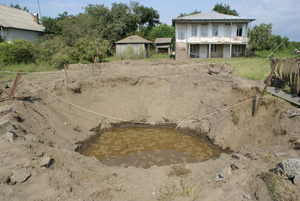 Zugdidi central market still works as well as all shopping malls in the city; municipality transport works with some delays but bank branches do not work at all. Zugdidi still has a reserve of food products. People do not walk in the streets. Most women, children and old people have been evacuated. They shelter other districts of Samegrelo region and Imereti region.
Zugdidi central market still works as well as all shopping malls in the city; municipality transport works with some delays but bank branches do not work at all. Zugdidi still has a reserve of food products. People do not walk in the streets. Most women, children and old people have been evacuated. They shelter other districts of Samegrelo region and Imereti region.
Liana Jikia, a resident of Senaki: “My husband and I remained at home; we were too proud to leave our house. But our children and grandchildren are evacuated. Russian planes were flying over my house. Now we depend only on the heaven mercy. For sure, Russian troops will leave their bloody trace here after departure.”
Zugdidi has already accepted a new wave of IDPs from Upper Abkhazia. On August 14 nearly 1 400 people arrived from Kodori Valley. Women, children and elderly people escaped air and artillery attacks in Omarishari. Gentsvisi, Chkhalta, Azhara and Ghvalvashi. They arrived in Zugdidi by trucks.
Most part of IDPs was under-age children and infants. Local population assisted them from the very beginning. Zugdidi residents supplied them with food and clothes before the IDPs left for Imereti region. Local authority took people from Kodori valley to Kutaisi in the early morning.
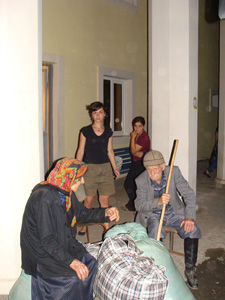 Currently, Zugdidi hosts IDPs from the villages of Samegrelo district. Russian and Abkhazian armed formations occupied the villages Ganmukhuri, Khurcha and Orsantia two days ago. Abkhazian-Russian armies are deployed in Tsalenjikha district too. They completely control the villages of Potskho, Muzhava and Fakhulani. Flags of Abkhazian separatist government are hoisted in these villages. Russian-Abkhazian military formations occupied and control the administration of the Enguri Hydro Electro Station.
Currently, Zugdidi hosts IDPs from the villages of Samegrelo district. Russian and Abkhazian armed formations occupied the villages Ganmukhuri, Khurcha and Orsantia two days ago. Abkhazian-Russian armies are deployed in Tsalenjikha district too. They completely control the villages of Potskho, Muzhava and Fakhulani. Flags of Abkhazian separatist government are hoisted in these villages. Russian-Abkhazian military formations occupied and control the administration of the Enguri Hydro Electro Station.
Armed formations got active in the villages of Gali district too. On August 15 special group from Sokhumi arrived in the village of Nabakevi and withdrew four men out of their own houses under threat of weapon. Location of Rezo Dzigua is still unknown. Relatives report that Avto Ekhvaia, Jemal Mamporia and Zurab Toria are placed in the isolators of militia stations in Gali and Sokhumi.
According to the spread information armed units move along the villages by cars and have a list of 400 people; the list was provided to them by security police of Sokhumi. Supposedly, the people on the list are those who participated in the hostilities of 1992-93 and 1998; the arrested men from Nabakevi were detained based on that data.
Several cases of robbery and attack have already occurred in the villages of Gali district. Robbers mostly kidnap cars and then Abkhazian militants demand money in return of them. Georgian men leave their houses in secret…
Russian troops openly patrol in the streets of Samegrelo towns. Russian military forces still occupy the buildings of Samegrelo-Zemo Svaneti regional police department, HQ of Georgian peace-keepers in conflict zone and governmental residence. Eight tanks and soldiers of Russian armed forces are still deployed in the territory. They have already taken office stuff and technical equipment from the offices.
Russian troops are still located near the village of Teklati, and at the crossroad of Poti, Senaki and Khobi. Military equipment is deployed on the place and occupants have set up military bases there. They have two military planes. Snipers are sitting on the roofs of the half-destroyed buildings. Militants are watching Poti motorway. Russian troops have occupied military bases in the neighborhood of Abasha district.
Military infrastructure of Poti is almost demobilized. Russian soldiers are destroying the ships of Georgian fleet and security forces.
Russian generals breached all agreements signed with local authority. Georgian side has been negotiating with Russian militants since August 10.
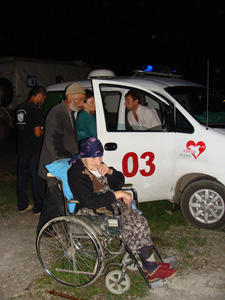 The negotiations started since the famous statements of David Bakradze, the chairman of the Georgian Parliament. He announced about upcoming attack on Zugdidi that panicked local population. Two hours later Mikheil Saakashvili arrived in Zugdidi. Georgian president called upon the population for peace, bravery and consolidation. Zugdidi was getting ready for defense.
The negotiations started since the famous statements of David Bakradze, the chairman of the Georgian Parliament. He announced about upcoming attack on Zugdidi that panicked local population. Two hours later Mikheil Saakashvili arrived in Zugdidi. Georgian president called upon the population for peace, bravery and consolidation. Zugdidi was getting ready for defense.
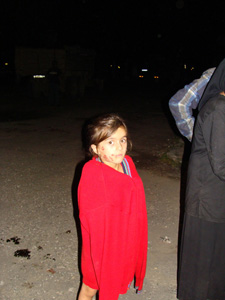
Aleksandre Akhvlediani, deputy regional governor: “It was hard time. It was too difficult to persuade people to stay calm. We were too weak to control the situation. First meeting was organized at the central bridge over Enguri River close to the post # 301 of CIS peace-keeping forces. We were seeking sources to avoid the controversy with Russian side. Russian General Sergei Chaban promised us that military forces would not exceed neutral zone of 12 kilometers. However, their movement covered larger territories.”
“General Ustinov stated to us that if we resisted them they would send army of 5 000 people from Babushera air-field in the direction of Zugdidi. We had no more choice. In this situation we preferred to protect our peaceful population. “
In Samegrelo region military bases are on fire; bombs are planted in the land. The region faces real danger even if Russian troops leave the territory. Anyway, the occupants do not hurry to leave the region.
News
December 13, 2023
Ethnic minorities outside the peace dialogue
November 6, 2023
‘Peace’ agenda of political parties
Popular
Articles
February 13, 2024



